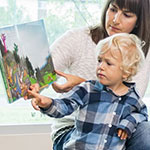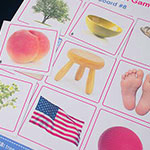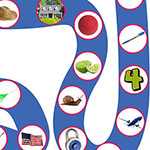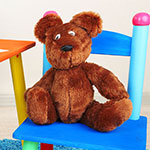Rhyming
B1: Rhyming Songs & Poems
Recite poems and sing songs with lots of rhymes in them, emphasizing and calling attention to the rhymes in various ways. Your child will learn that different words can sound very similar.
B2: Rhyme Match Game
Play a simple board game, in which the child matches a picture card to a picture on the board representing the rhyming word. This is a fun way for her to practice finding the rhyming pair among a group of words.
B3: Catch the Match
Play a simple board game with your child, in which he will have to match one of his picture cards to a picture on the board representing the rhyming word. This is a fun way for him to practice finding the rhyming pair among a group of words.
B4: Rhyme Memory Game
You and your child must find rhyming pairs by gradually turning over picture cards. She will reinforce her understanding of rhymes as well as work on her memory and concentration skills.
B5: Rhyme & Movement
In this multisensory activity, a group of children will use nursery rhymes and movement to focus their attention on the rhyming words.
B6: Fill in the Rhyme
Complete phrases and sentences with rhyming words. Your child will learn to rely on contextual cues to create rhymes.
B7: Rhyming Climbing
Match rhyming action words with an -ing suffix. Your child will learn to listen beyond the -ing suffix and pay attention to word stems.
B8: Can You Make a Rhyming Word?
Come up with a one-syllable rhyming word to match the one in a song. This game introduces your child to the skill of coming up with his own rhymes.
B9: Pack the Plane!
Complete a sentence with multiple rhyming words. Your child will learn to create rhymes quickly with no contextual clues.
B10: I Spy…A Rhyme
Play the classic game of I Spy, looking for an item in the room that rhymes with the clue you provide. An exercise in finding rhyming words within the child’s environment.
1. Overview
With the listening games, activities were structured from the simple to the complex. Children should play the listening games until they have mastered them. Actively listening lays the foundation for children to hear words that rhyme.
Rhyming activities highlight the similarities and differences between words. These games will also introduce the idea that words have structure as well as meaning.
The human brain is hard-wired for the sounds of singing, rhythm, meter, and rhyme. Exposure to these elements early on as infants and toddlers sets the stage for attending to language — its cadence, its meaning, and finally its structure.
2. Rhyming Activities
- B1: Rhyming Songs & Poems – Recite poems and sing songs with lots of rhymes in them, emphasizing and calling attention to the rhymes in various ways. Your child will learn that different words can sound very similar.
- B2: Rhyme Match Game – Play a simple board game, in which the child matches a picture card to a picture on the board representing the rhyming word. This is a fun way for him to practice finding the rhyming pair among a group of words.
- B3: Catch the Match – Play a simple board game with your child, in which he will have to match one of his picture cards to a picture on the board representing the rhyming word. This is a fun way for him to practice finding the rhyming pair among a group of words.
- B4: Rhyme Memory Game – You and your child must find rhyming pairs by gradually turning over picture cards. She will reinforce her understanding of rhymes as well as work on her memory and concentration skills.
- B5: Rhyme & Movement – In this multisensory activity, a group of children will use nursery rhymes and movement to focus their attention on the rhyming words.
- B6: Fill in the Rhyme – Complete phrases and sentences with rhyming words. Your child will learn to rely on contextual cues to create rhymes.
- B7: Rhyming Climbing – Match rhyming action words with an -ing suffix. Your child will learn to listen beyond the -ing suffix and pay attention to word stems.
- B8: Can You Make a Rhyming Word? – Come up with a one-syllable rhyming word to match the one in a song. This game introduces your child to the skill of coming up with his own rhymes.
- B9: Pack the Plane! – Complete a sentence with multiple rhyming words. Your child will learn to create rhymes quickly with no contextual clues.
- B10: I Spy…A Rhyme – Play the classic game of I Spy, looking for an item in the room that rhymes with the clue you provide. An exercise in finding rhyming words within the child’s environment.
Leave a Reply











3 Responses to “Rhyming”
susan montagna -vogt
I am a speech pathologist working with autistic children and preschool speech and language students. I read an article suggesting listening to environmental sounds is a foundational step to auditory awareness for letter sound discrimination. My principal would like to see the research that supports this approach. Can you share any research sources that document this link? My school email is svogt@cheshire.k12.ct.us
Sally
I love sight words website but today it had ads on the top, bottom, and left right. It was hard to get to what I wanted. Is this normal?
Sight Words Admin
Hi Sally, We are sorry that the ads are troubling you. Kindly click on the “x” on the top right corner of each ad if you prefer not to see them. These are Google partner advertisers. We hope that you are still able to find the articles and games you need on our site!